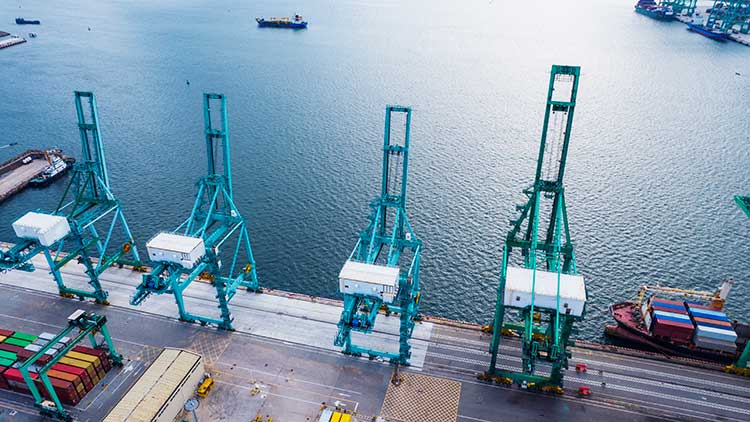
Hong Kong is one of the most popular trading hubs in Asia with busiest free ports without imposing any customs tariff on imports or exports. In 2020, Hong Kong ranked 6th among leading global traders, according to the World Trade Organization (WTO).
It’s not by chance that Hong Kong has a reputation for being one of the most trade-conducive entrepot in the world. The country has a strategic location, and well-developed infrastructure, making it an ideal place to set up a trading company.
If you are interested in launching a trading business, take this guide to know how to start a Hong Kong trading company.
1. 3 main types of trading companies in Hong Kong
Hong Kong is one of the world’s leading trading economies, and is a destination for many international businesses. Put simply, a trading company is a business that imports and exports products on behalf of other companies.

There are three main types of trading companies in Hong Kong: import trading companies, export trading companies, and entrepot trading companies.
Import Trading Company (ICT)
Import trading companies in Hong Kong engage in the business of importing and exporting goods. They buy products from overseas suppliers and then sell those products to customers in the country.
These companies are typically involved in the sourcing, marketing, and distribution of imported goods. Many import trading companies are small to medium-sized enterprises that focus on a specific product or market niche.
Export Trading Company (ETC)
Hong Kong export trading companies specialize in helping other companies export their products.
They typically work with a network of suppliers and buyers in different countries, and help to facilitate the sale and shipment of goods between them.
Entrepot
Entrepot trading companies in Hong Kong are involved in the business of buying and selling goods that are imported into, and then exported out of, the city.
These companies take advantage of Hong Kong’s free port status to import goods without paying duties or tariffs. They then store the goods in bonded warehouses before selling them on to buyers in other countries.
2. How to start Hong Kong trading company
As trading activities are always associated with revenue generation, you will need to legitimate your business before commencing any trading operations in Hong Kong. The process is simple and straightforward, and can be completed online.

Here is a step-by-step guide to help you get the business started:
Step 1: Registering a Hong Kong trading company
The first step in starting a trading company in Hong Kong is to register the business with the Companies Registry (CR) – official department that manages the business registration and licensing regime.
First, choose the right business structure
The most common structures used by trading companies are sole proprietorship, partnership, and limited liability company (LLC).
Sole proprietorship is the simplest structure with easy formation and low cost. This structure is suitable for businesses with a single owner, no employees, and an insignificant earnings. The owner of the business is solely responsible for its debts and liabilities, so operating a sole proprietorship involves high risks.
Partnership is the collaboration of two or more owners. Under this structure, you can hold a General Partnership or a Limited Partnership. While general partners are liable for the business debts and obligations, limited partners aren’t.
Limited liability company (LLC) is a more complex business structure but offers limited liability protection to the owners. This means that you won’t be personally responsible for the company debts and liabilities, for example, when it gets sued.
Uncover Hong Kong Business Entity Types: Pros and Cons to see which one fits your business best.
Next, register your trading business with CR
After you have chosen the right business structure for your trading company, the next step is to register your Hong Kong trading company with CR. This can be done online, and typically takes around four hours to complete.
Generally, you will need to provide the following information when registering your company:
- The company name;
- The company address;
- The company type (e.g. private limited liability company);
- The registered address of the company;
- The names and addresses of the directors and shareholders of the company.
Once your company is registered, CR will issue registration certificates (Certificate of Incorporation and Business Registration Certificate) to you as proof of your business’s legal existence. These documents must be displayed at your registered office address.
Want to get a detailed instruction? Keep reading on How To Set Up A Company In Hong Kong: A Step-by-Step Guide
Step 2: Applying for relevant licenses and permits
If you want to engage in trading activities in Hong Kong, you will need to obtain the relevant licenses and permits from the government. The types of licenses and permits required will depend on the nature of your business.
Certain types of import/ export products are typically under control of different authorities
| Types of products | Responsible authorities |
| Customs and Excise Department |
| Customs and Excise Department/ Department of Health |
| Agriculture, Fisheries and Conservation Department |
| Department of Health |
| Chinese Medical Council |
| Food and Environmental Hygiene Department |
| Environmental Protection Department |
| Telecommunications Authority |
| Trade and Industry Department |
*Dutiable goods include alcoholic liquors, tobacco, hydrocarbon oil & methyl alcohol.
You can find out more about the licenses and permits required for trading activities in Hong Kong here.

Step 3: Proceeding import and export clearances
Before goods come to your hand, C&ED will inspect the goods and require relevant documents for the clearance with typically no need of your physical presence.
You should prepare these documents before the inspection to have your products cleared faster:
- Manifests;
- Import/ export license or removal permit* (if required);
- Copy of detention notice (if applicable); and/ or
- Other supporting documents such as bill of lading, airway bill, invoice, packing list etc.
*Removal permit is required for the removal of dutiable goods.
Step 4: Filing import/ export declarations
An import/ export declaration, or customs declaration, is to list and give details of goods that are being imported or exported to Hong Kong customs. The Customs and Excise Department (C&ED) is the official department responsible for related management.
An import/export declaration is required for all shipments of goods entering or leaving Hong Kong if not exempted. The declaration must be lodged with the Commissioner of Customs and Excise within 14 days after the importation or exportation.
The declaration must be lodged electronically via either three service providers appointed by the government:
- Brio Electronic Commerce Limited;
- Global e-Trading Services Limited; or
- Tradelink Electronic Commerce Limited.
Note that manual declarations are no longer accepted.
Depending on your specific trading situation, there are different types of declaration forms:
- Form 1 – for importing non-food items;
- Form 1A – for importing food items;
- Form 1B – for importing items exempted from declaration charge;
- Form 2 – for exporting/ re-exporting items except for manufactured clothing and footwear items;
- Form 2A – for exporting manufactured clothing and footwear items;
- Form 2B – for exporting/ re-exporting items exempted from declaration charge.
The following information is regularly required for the declaration:
- Importer/Exporter Details (Name, address, contact details, business registration number/Hong Kong identity card number);
- Shipment Details (Importing/ exporting country, relevant dates);
- Transportation Details (Transport mode, number of the cargo and means of transportation );
- Commodity Details (Origin country );
- Packaging Details;
- Submission Details.
Penalty for late lodgement of import/ export declaration is subject to a monetary penalty:
- HKD 20 for one month late;
- HKD 40 for two months late;
- HKD 100 for more than two months late.
If the value of goods is over HKD 20,000, the charges will be doubled.
Step 5: Submitting customs fees and duties
Hong Kong is well-known for its free ports. Your company is free of customs tariff for importing or exporting goods. Additionally, no Value Added Tax (VAT) or Goods and Services Tax (GST) is applicable on goods imported or exported.
The only fee that you must be aware of is the excise duty. However the duty is only subject to the importing or exporting of the liquors, tobacco, hydrocarbon oil and methyl alcohol at specific rates.
3. Taxation for your trading business
As a trading company in Hong Kong, you will be subject to taxation on your profits, or called as profits tax. The tax rate for trading companies is 16.5% for profits over HKD 2,000,000, and 8.25% for the lower income. However, you may be eligible for certain tax reliefs and deductions.
When it comes to taxation, there are a few key things that you need to keep in mind:
- Make sure that you are registered for taxation purposes with the Inland Revenue Department (IRD);
- Keep accurate records of your income and expenses;
- File your tax returns on time.
If you fail to comply with Hong Kong tax obligations, you may be subject to penalties. Therefore, it is important to ensure that you are compliant with all taxation requirements.
5. Finance instruments for Hong Kong trading company
As a trading company, you will need to have a bank account in order to manage your business finances. You should consider the range of services the banks cover to suit your trading needs. Three common finance solutions provided by Hong Kong financial institutions for trading businesses are:
- Letters of Credit – issued by banks to work as a guarantee letter of seller’s payments;
- Short-term finance – used to meet working capital requirements (less than 1 year). Main types are trade credit, short term loans, business line of credit, invoice discounting, factoring;
- Export credit insurance – used to mitigate risks of non-payments for exporters.
Required documents for opening a Hong Kong bank account may vary depending on the bank, but usually include a valid ID, proof of address, and proof of business registration.
In some cases, especially foreigners, it is ineligible to open a bank account due to complex procedures or difficulty in providing physical verification. You can start a business account with an E-money Institution (EMI) – an alternative to a bank.
6. Conclusion
As you can see, there are many steps involved in starting a trading company in Hong Kong. But don’t let that discourage you – with careful planning and execution, your trading company can be up and running in no time. Just remember to do your research, choose the right business structure, and stay compliant with all the applicable regulations.
Disclaimer
While BBCIncorp strives to make the information on this website as timely and accurate as possible, the information itself is for reference purposes only. BBCIncorp would like to inform readers that we make no representation or warranty, express or implied. Feel free to contact BCCIncorp’s customer services for advice on specific cases.
Get helpful tips and info from our newsletter!
Stay in the know and be empowered with our strategic how-tos, resources, and guidelines.

